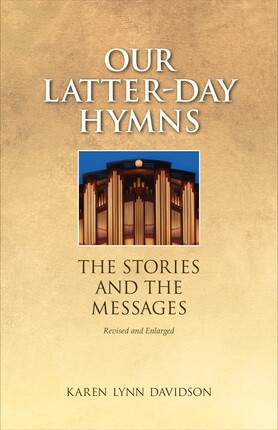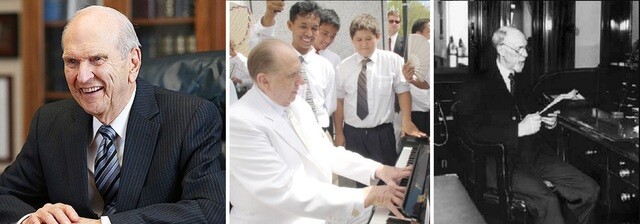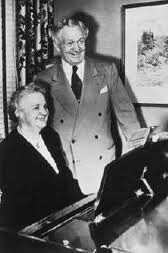Only three months after the Church was officially organized, the Lord instructed Emma to make a selection of hymns to be used by the Saints:
"And it shall be given thee, also, to make a selection of sacred hymns, as it shall be given thee, which is pleasing unto me, to be had in my church.
"For my soul delighteth in the song of the heart; yea, the song of the righteous is a prayer unto me, and it shall be answered with a blessing upon their heads" (Doctrine & Covenants 25:11-12).
Ever since Emma Smith compiled that first set of hymns in 1835, music has become an important part of LDS worship. Today, there are 341 hymns in the standard English hymnal, but we can each only have one favorite.
From Joseph Smith to President Russell M. Nelson, find out the favorite hymns of the prophets.
► You'll also like: 10 Things You Didn't Know about Your Favorite LDS Hymns
Joseph Smith
"A Poor Wayfaring Man of Grief"
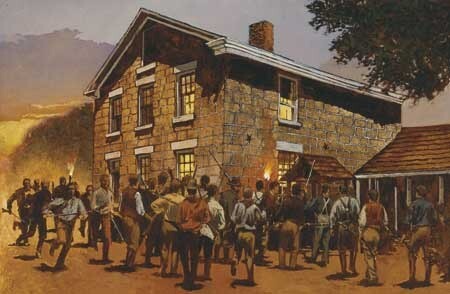
Photo fromlds.org
It has long been assumed that "A Poor Wayfaring Man of Grief" was one of Joseph Smith's favorite hymns. The song was quite new in his day. The text first appeared in an 1834 anthology as a poem titled "The Stranger," and the melody used to sing it was different from today's hymnal.
Before Joseph was martyred in Carthage jail, Elder John Taylor sang this melancholy tune to those present. A short time after he finished, Joseph's brother Hyrum requested that Elder Taylor sing it again. Elder Taylor later reported his response to that request, saying, "'Brother Hyrum, I do not feel like singing,' when [Hyrum] remarked, 'Oh, never mind; commence singing, and you will get the spirit of it.' At his request I did so."
Shortly after Elder Taylor finished singing, a mob attacked Carthage jail and murdered both the prophet and his brother.
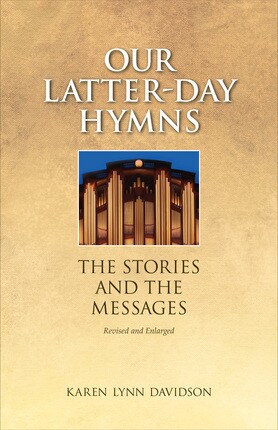
Learn more in Our Latter-day Hymns: The Stories and the Messages.
If you enjoy the hymns of The Church of Jesus Christ of Latter-day Saints, then you will enjoy Our Latter-day Hymns: The Stories and the Messages. In this volume you will find the stories of all the hymns in the 1985 LDS hymnbook, so far as those stories are known. Some of the hymns came about in ways that are quite dramatic and personal; others came into being under ordinary circumstances. And each of the more than three hundred hymns has a message all its own.
Brigham Young
"When First the Glorious Light of Truth"
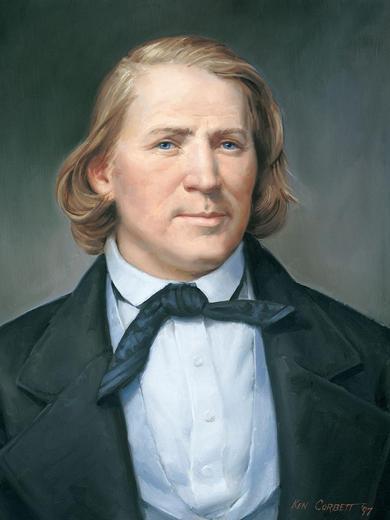
Of President Brigham Young's favorite hymn, "When First the Glorious Light of Truth," President Heber J. Grant said the following during the October 1919 general conference:
"President Lyman said that President Brigham Young's [favorite hymn] was, 'Oh, ye mountains high;' but I have since been told by one of his daughters that this is a mistake, that his favorite was Brother William Clayton's hymn, 'When first the glorious light of truth, burst forth in this last age, How few there were with heart and soul, to obey it did engage.'"
This hymn, which bore no name in the hymnal, was known by its first line (as President Grant recalls above). It was kept in the Church hymnal until 1985 when a new hymnal was published with a revised list of songs.
Photo from history.lds.org
John Taylor
Possibly "Go, Ye Messengers of Glory" & "Go, Ye Messengers of Heaven"
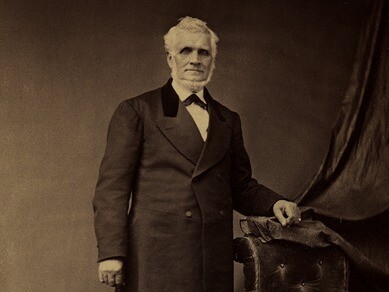
Photo from history.lds.org
While history has not recorded President John Taylor's favorite hymn, it does note he was well-known for his singing voice and love of music. In fact, he wrote the lyrics to two of today's current hymns: "Go, Ye Messengers of Glory" and "Go, Ye Messengers of Heaven."
These two hymns both reflect President Taylor's fervor for missionary work. At the time he penned them, he was serving as a missionary in Britain. His efforts there would bring thousands of souls to a knowledge of the truth.
Later, President Taylor also served as an editor for the 1840 hymnal, and he likely enjoyed much of the music included therein.
Learn more in Our Latter-day Hymns: The Stories and the Messages.
Wilford Woodruff
“God Moves in a Mysterious Way”
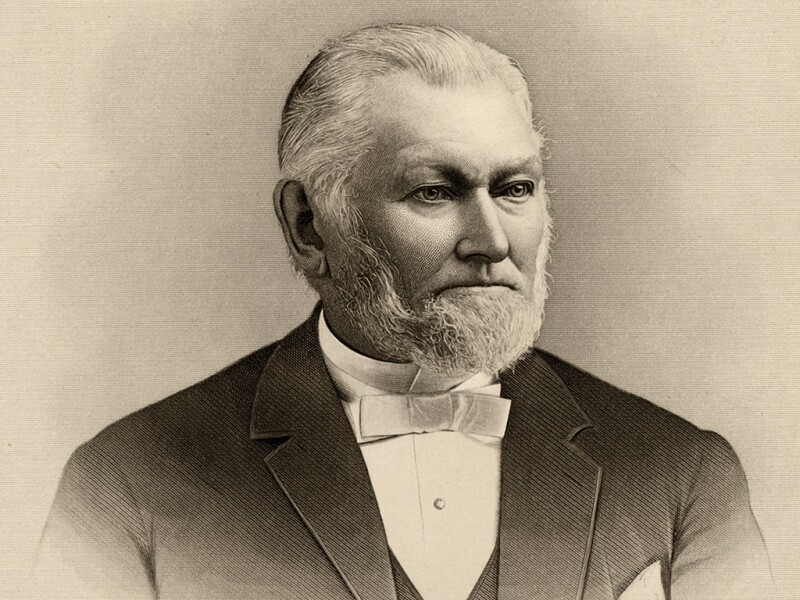
Image from history.lds.org
The favorite hymn of President Wilford Woodruff was "God Moves in a Mysterious Way." Heber J. Grant, who served as an apostle when President Woodruff was prophet, recalled:
“He loved [that hymn]. We sang it, I am sure, sometimes twice a month in our weekly meetings in the Temple, and very seldom did a month pass by when that song was not called for by Brother Woodruff.”
Another apostle serving with President Woodruff, Matthias F. Cowley, observed:
“Perhaps no man in the Church ever felt more profoundly the truth of the words, ‘God moves in a mysterious way His wonders to perform,’ than Wilford Woodruff. He was so intensely spiritual, so completely devoted to the service of God, that all through his life the miraculous manifestations of God’s purposes were abundantly given. He had never based his faith upon miracles; they merely confirmed what he believed with all his heart and supported his ideas of the teachings of Holy Writ.”
Read more in Teachings of Presidents of the Church: Wilford Woodruff.
Lorenzo Snow
"Zion Stands with Hills Surrounded"
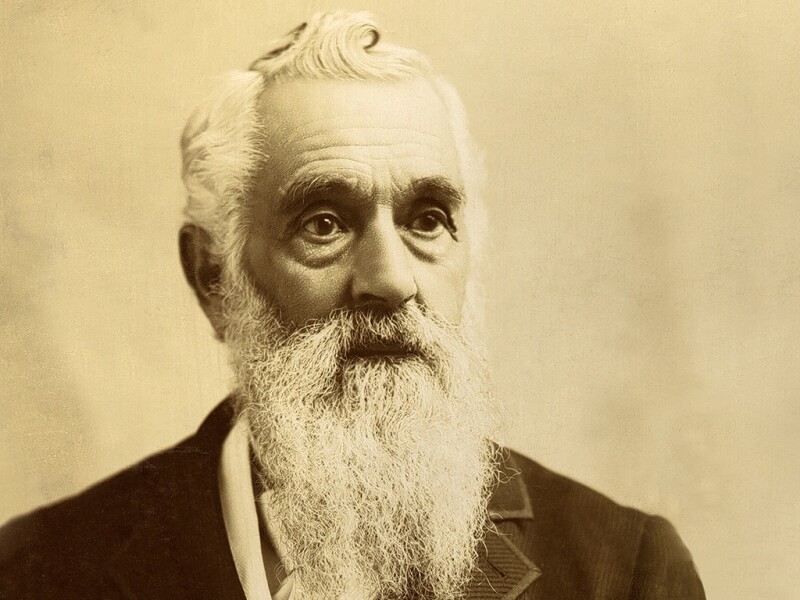
Photo from history.lds.org
According to President Heber J. Grant (recorded in the October 1919 general conference) "Zion Stands with Hills Surrounded" was the favorite hymn of President Lorenzo Snow.
Surprisingly, despite its many seemingly overt references to LDS doctrine, the lyrics of this hymn were penned in the 18th century, before the Restoration. George D. Pyper, fifth general superintendent of the Sunday School and a manager of the Tabernacle Choir, speculated:
"The author . . . must have foreseen a condition that did not exist until seventy-seven years after he penned the lines." He added, "It was an inspired prophecy; for no Latter-day Saint could have more perfectly described the belief of the Mormon people than did Thomas Kelly back in the eighteenth century."
Learn more in Our Latter-day Hymns: The Stories and the Messages.
If you enjoy the hymns of The Church of Jesus Christ of Latter-day Saints, then you will enjoy Our Latter-day Hymns: The Stories and the Messages. In this volume you will find the stories of all the hymns in the 1985 LDS hymnbook, so far as those stories are known. Some of the hymns came about in ways that are quite dramatic and personal; others came into being under ordinary circumstances. And each of the more than three hundred hymns has a message all its own.
Joseph F. Smith
"Uphold the Right"
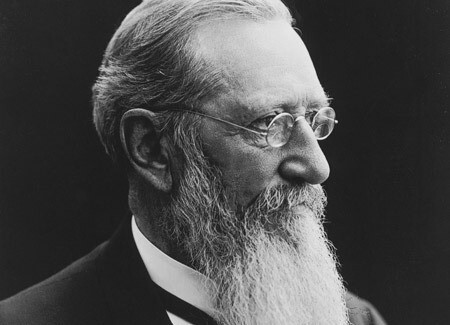
Photo from lds.org
In a eulogy in memory of President Joseph F. Smith, President Heber J. Grant reminisced that "Uphold the Right, Though Fierce the Fight" was President Smith's favorite hymn. He reports:
"I asked [President Smith] one day, which was his favorite hymn, and he said he did not have any. I said, 'Well, Brother Lyman told me I ought to have one. I wish you would select one.' 'Well,' he said, 'I think I would hardly care to, but perhaps I am partial to the hymn by that heroic little soul, Sister Emily Hill Woodmansee, entitled, 'Uphold the Right.'"
The lyrics of the first verse went like this:
Uphold the right, tho' fierce the fight, And pow'rful is the foe; As freedom's friend, her cause defend, Nor fear nor favor show. No coward can be called a man-- No friend will friends betray; Who would be free alert must be; Indifference will not pay.
This song, written by Sister Emily Hill Woodmansee, hasn't been printed as an LDS hymn since the 1927 version of the hymnal.
Learn more in The Improvement Era (1919).
Heber J. Grant
“Come, Come, Ye Saints,”
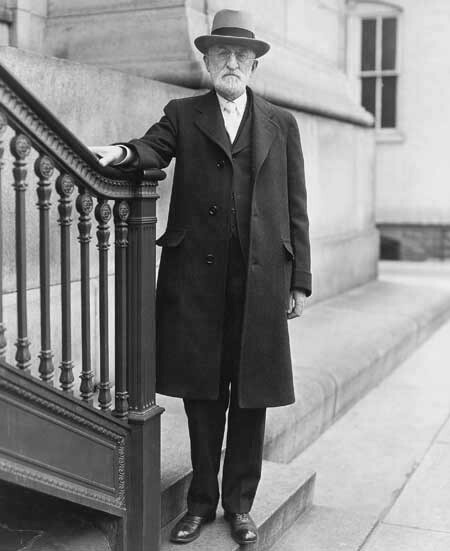
The favorite hymn of President Heber J. Grant celebrates his pioneer heritage: "Come, Come, Ye Saints." He said:
“I have never heard and never expect to hear, to the day of my death, my favorite hymn, ‘Come, come, ye Saints, no toil nor labor fear, But with joy wend your way,’ [without thinking] of the death and the burial of my little baby sister and the wolves digging up her body on the plains. I think of the death of my father’s first wife and the bringing of her body here for burial.”
According to Teachings: Heber J. Grant, he reportedly "felt that it was important for Church members to understand the hymn—particularly the fourth verse, with its message of hope regarding those who 'die before [the] journey’s through' and those whose lives are 'spared again to see the Saints their rest obtain.'"
Learn more in Teachings: Heber J. Grant.
Photo from lds.org
George Albert Smith
"Let Us Oft Speak Kind Words"
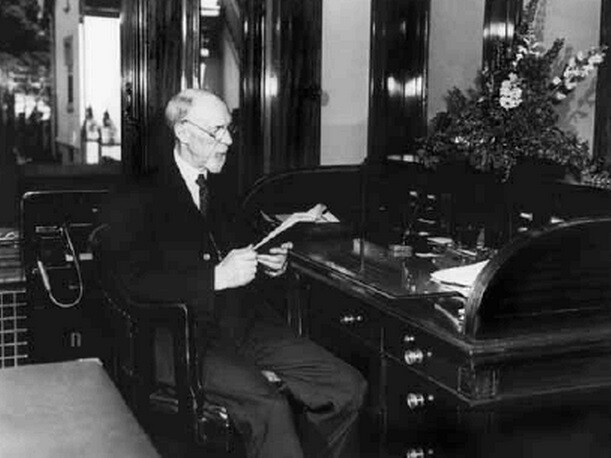
Photo from ldsces.org
In a 2009 BYU devotional, President Thomas S. Monson shared that President George Albert Smith’s favorite song was “Let Us Oft Speak Kind Words.” The author of this hymn, Joseph L. Townsend, wrote it while serving in the superintendency of a large Sunday School. He often heard many fault-finding remarks among the attendees and penned this hymn with the hope that it would encourage kind words spoken more often.
“Let Us Oft Speak Kind Words” was a song that President Smith personified, as President Monson explains, "A trait of President Smith’s which he would no doubt encourage us to incorporate in our lives would be compassion. This great leader had a compassionate heart."
Learn more in President Monson's address, Principles from Prophets.
David O. McKay
"Oh Say, What Is Truth?"
, a favorite hymn of President David O. McKay was "Oh Say, What Is Truth?"
This hymn was written by an early Latter-day Saint missionary, John Jacques. Our Latter-day Hymns recounts:
"It is likely that John Jacques was weighed down many times by the hardships of his calling, but he took comfort in recalling the all-consuming and overriding value of the truth whose messenger he was. These words might well serve as a morale-building reminder to a discouraged missionary. If truth is really 'the brightest prize / To which mortals or Gods can aspire,' then it is worth any sacrifice."
Photo from music.utah.edu
Learn more in Our Latter-day Hymns: The Stories and the Messages.
If you enjoy the hymns of The Church of Jesus Christ of Latter-day Saints, then you will enjoy Our Latter-day Hymns: The Stories and the Messages. In this volume you will find the stories of all the hymns in the 1985 LDS hymnbook, so far as those stories are known. Some of the hymns came about in ways that are quite dramatic and personal; others came into being under ordinary circumstances. And each of the more than three hundred hymns has a message all its own.
Joseph Fielding Smith
"Prayer Is the Soul's Sincere Desire"
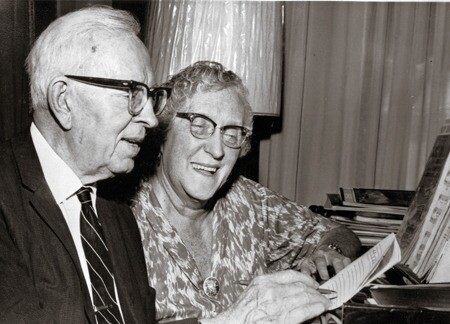
Photo from lds.org
Recalling President Joseph Fielding Smith's favorite hymn, President Thomas S. Monson recounts: "His favorite song was 'Prayer Is the Soul’s Sincere Desire.' And I’ll add the next thought: 'uttered or unexpressed.'”
In today's hymnal, this song is unique because it retained all eight verses through the editing process for the 1985 songbook. This was done in order to keep the doctrinal teachings outlined in each verse, which all detail a different aspect of prayer without repeating.
Learn more in Our Latter-day Hymns: The Stories and the Messages.
Harold B. Lee
"Praise to the Man"
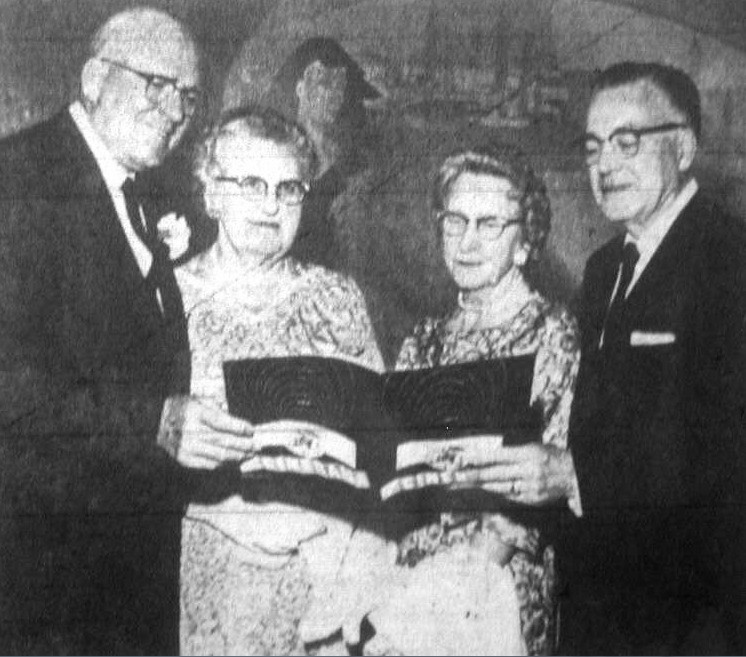
Photo from Deseret News, 22 July 1961, page B1
In a devotional address, President Thomas S. Monson recalled his experience with President Harold B. Lee's favorite hymn:
"When I was first called to the Twelve, I noted that Brother Lee was playing the organ. And he said, 'Brother Monson, as our newest apostle, would you choose the song you’d like for us to sing today?' And I chose his favorite, and we all sang it with gusto."
The hymn is a favorite for many Latter-day Saints, and was inspired by Sir Walter Scott's poem, "Lady of the Lake." William W. Phelps, using that as a framework, penned "Praise to the Man" shortly after the martyrdom of Joseph Smith. It was likely was sung to the tune of "Hail to the Chief" in the early days of the Church, but today, it is sung to a variant of "Scotland, the Brave."
Learn more in Our Latter-day Hymns: The Stories and the Messages.
Spencer W. Kimball
"I Need Thee Every Hour"
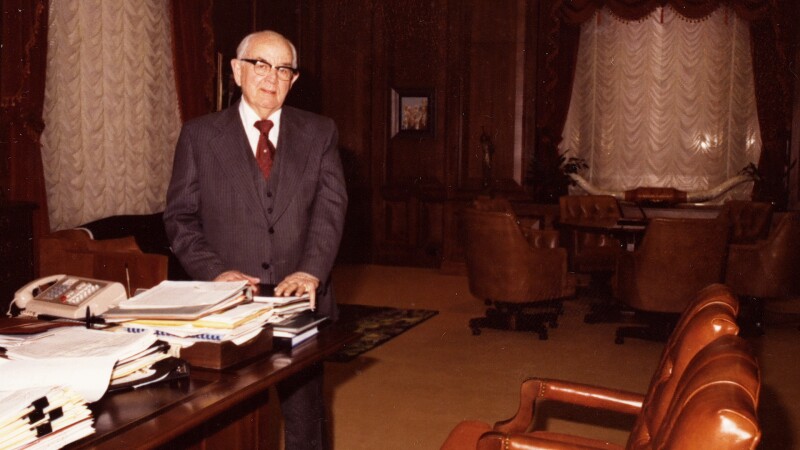
Photo from history.lds.org
As he shared one of President Spencer W. Kimball's favorite hymns, "I Need Thee Every Hour," President Thomas S. Monson emphasized: "Let’s remember that [favorite hymn] particularly. That choice demonstrates his humility."
As explained in Our Latter-day Hymns:
"Though not of Latter-day Saint origin, this hymn strikes a meaningful chord among Latter-day Saints in its humble pleading for the constant presence of the Savior. In this hymn, we petition Him repeatedly to be with us, not just in times of trial, not just on special spiritual occasions, but every hour."
Learn more in Our Latter-day Hymns: The Stories and the Messages.
Ezra Taft Benson
"How Great Thou Art"
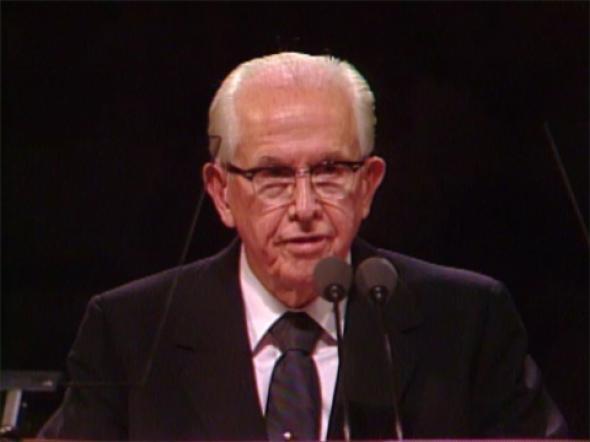
Photo fromlds.org
President Benson’s favorite hymn was “How Great Thou Art." This moving hymn was among the selections sung at his funeral, which included several of his other favorite hymns, such as "An Angel from on High" and "O Divine Redeemer."
Today's version of President Benson's favorite hymn is loosely based on a German translation of a Russian translation of a Swedish hymn, "O Mighty God." In 1923, English missionaries heard the song in German and translated it from memory, and added new pieces based on the breathtaking scenery they witnessed in their travels.
However, at that time, they only wrote the first three verses.
The fourth verse didn't come until after World War II. Those same missionaries added the last verse, inspired by refugees in Britain who constantly asked, "When can we go home?" Thus, the fourth verse focuses on the joys of our heavenly home.
Howard W. Hunter
"Have I Done Any Good in the World Today?"
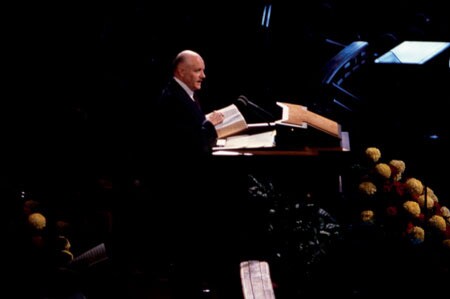
Photo from lds.org
While President Howard W. Hunter is well-known for his love of all the hymns, President Thomas S. Monson recalls that one of his favorites was "Have I Done Any Good in the World Today?"
For the 1985 hymnal, the committee altered a line of lyrics in President Hunter's favorite hymn: the line which now reads "Only he who does something helps others to live. / To God, each good work will be known" originally read, "Only he who does something is worthy to live, / The world has no use for a drone."
The problematic lyrics were changed in order to reflect that life is sacred and needs no justification but that able-bodied people shouldn't be idle.
Learn more in Our Latter-day Hymns: The Stories and the Messages.
Gordon B. Hinckley
"God of Our Fathers, Known of Old"
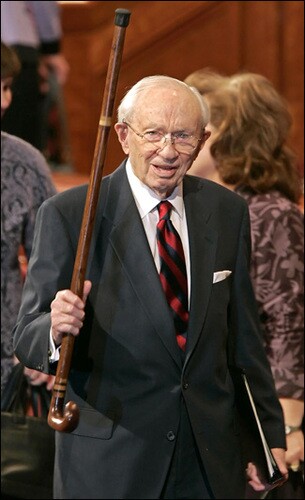
While many hymns were favorites of President Gordon B. Hinckley, one sticks out to President Thomas S. Monson: "God of Our Fathers, Known of Old," written by Rudyard Kipling. "That's the British in him," President Monson shares.
Kipling's original hymn has two verses excluded from the LDS hymnal:
If, drunk with sight of power, we loose Wild tongues that have not thee in awe, Such boastings as the Gentiles use, Or lesser breeds without the law-- Lord God of Hosts, be with us yet, Lest we forget--lest we forget!
For heathen heart that puts her trust In reeking tube and iron shard; All valiant dust that builds on dust, And guarding, calls not thee to guard, For frantic boast and foolish word-- They mercy on thy people, Lord!
Learn more in Our Latter-day Hymns: The Stories and the Messages.
Photo from npr.org
Thomas S. Monson
"Master, the Tempest is Raging"
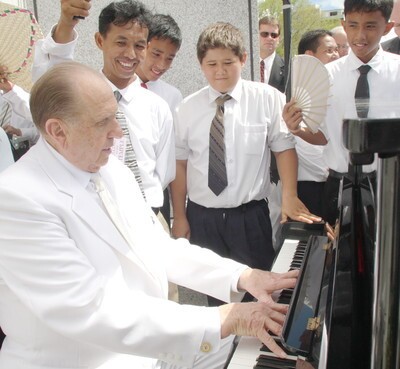
"Master, The Tempest is Raging" was a favorite hymn of President Thomas S. Monson's childhood. He recounts:
"We had a chorister who taught us boys how to sing. We had to sing. Sister Stella Waters would wave the baton within inches of our noses and beat time with a heavy foot that made the floor creak.
"If we responded properly, Sister Waters let us choose a favorite hymn to sing. Inevitably, the selection was, 'Master, the Tempest is Raging.'
[. . .]
"As a boy, I could fathom somewhat the danger of a storm-tossed sea. However, I had but little understanding of other demons which can stalk our lives, destroy our dreams, smother our joys, and detour our journey toward the celestial kingdom of God."
Learn more in his October 2002 general conference address, "Peace, Be Still."
Photo fromldschurchnews.com
Russell M. Nelson
"My Message"
President Russell M. Nelson composed his own hymn, “My Message”— a song he wrote that comprises the life he strives to live by and the gratitude he has for his family and God.
“Our God is my maker; Parents dear are my guide; An angel wife, my true love; children choice are my pride. The Lord is my Light; His endless truth, my law. My joy is in service to others; My message is, my life.”
In a2008 BYU devotional,
President Nelson said he believes music has a power to promote unity and love in families. According to lds.org, President Nelson has perfect pitch and a talent in playing the organ. One Christmas, he recorded a variety of music he had sung to his children through the years on a compact disk as a gift to his family.
President Nelson shared a verse of the song in his book The Power Within Us saying, “As my name appears as author, I realize that, to a real extent, I am the product of others. From each wonderful person I have met, I have tried to acquire a measure of goodness.”
Learn more in his book The Power Within Us.
Photo from ldschurchnews.com
